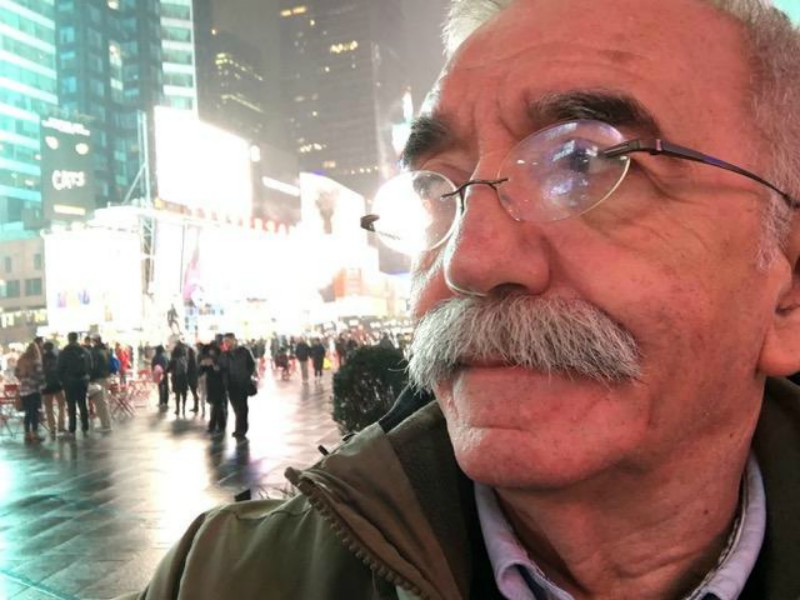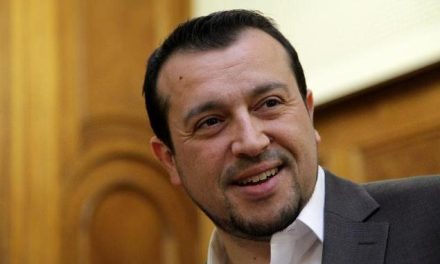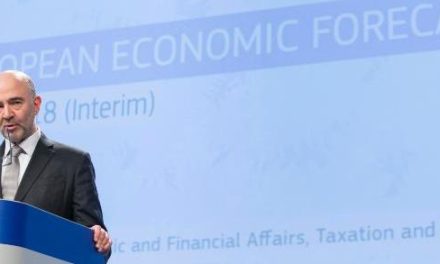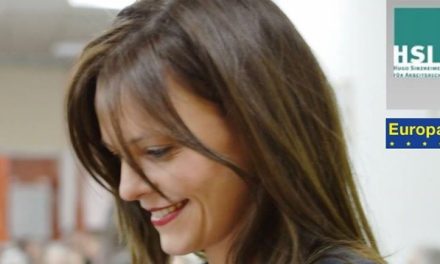Slobodan Unkovski (Skopje, 1948) is a theatre director who also teaches acting and theatre directing. He has staged many performances in the former Yugoslavia, Russia, Italy, Sweden, Belgium, Germany and USA. Greek audiences got to know him when he directed The Fourth sister and King Lear for the National Theatre of Greece in Athens and Orestes for the National Theatre of Northern Greece in Thessaloniki, and the Athens & Epidaurus Festival. From 1996-1998, he served as Minister for Culture in FYROM.
In his interview with Greek News Agenda*, Mr. Unkovsky sees the Prespa Agreement as a possibility of closure to long lasting dramas, admits that we know so little about each other and proposes concrete measures for a genuine rapprochement of cultures. He urges governments and intellectuals of both sides to surf the wave of positive feelings linked to this special moment in history while he identifies Theatre as his true Fatherland.
What is your opinion on the Prespa Agreement?
I genuinely believe that the Prespa Agreement is of immense importance for both our countries. The tangle, in which previous talks had ended, made the name dispute look like an inextricable knot similar to the one Alexander the Great had to cut with his sword. Finding a solution to this dispute proved to be a particularly difficult undertaking, one that could affect the internal stability of the two countries and, needless to say, jeopardize the political careers of those attempting to cut the knot.
Neglected over a long period, the problem Greece had with our name (regardless of how irrational it sounded to us) and with our identity, tied to the name Macedonia and to the ethnonym Macedonians, became so big and seemingly impossible to solve that at one point the negotiations mediated by Matthew Nimetz under the auspices of the UN produced no visible results whatsoever. Meanwhile, in Macedonia, the identity-engineering by former prime minister Gruevski and President Ivanov, implemented via the process of antiquization of Macedonian history and the erasure of its Slavic roots, was articulated in the corruptive Skopje 2014 project -under which statues of Alexander, Philip and Olympias were bestrewn all over the centre of the capital- and in a narrative recognized by the nationalists as their own. Thus the problem grew even bigger and it seemed impossible to find a solution to the name issue. I suppose you already know enough about the Greek embargo in the past, the NATO Summit in Bucharest and various other developments, so there’s no need for me to elaborate on this further.
Watching the live TV coverage of the signing of the Agreement in Prespa, the profound consideration of each side for the other and the chief negotiators’ mutual trust and friendship, unseen before in the relations between our two countries, made us witnesses to something that would have seemed absolutely impossible just a few months earlier, but now actually happening. The shift caused by the change of the name of a country is tectonic. It is not easy, and each and every one of us has gone through a personal drama as regards this. Nevertheless, I consider the addition of the adjective “North” as a fair and realistic long-term solution, considering the situation in the field.
The Prespa Agreement not only offers a possibility of closure after a thirty-year period of dispute and an opportunity for a genuine normalization of bilateral relations, but also, in my view, an invisible and belated closure of certain aspects of the fate of the people affected by the Greek Civil War that led to enormous sufferings for the Slav population and their countless victims in Northern Greece/ Aegean Macedonia. (Here I would like to warmly recommend the text written by Kica Kolbe, a professor and author residing in Germany, on the fate of her Macedonian/Slav family in the course and the aftermath of the Civil War, published in the Greek newspaper Avgi some weeks ago). It would seem that the successors of the communist parties of the two countries, Syriza and SDSM, have the necessary courage to find a win-win solution to the problem that would satisfy both sides -without fearing the risk for their own political future or for their very lives- building a new spirit of communication and cooperation in the Balkans.
As an intellectual but also as a former Minister of Culture, could you propose concrete confidence building measures in the area of culture that the two countries could take in the near future in order to enhance mutual understanding and promote cultural dialogue?
I was Minister for Culture from 1995/96 to 1998, and one of the first members of our Government to visit Greece after the Republic of Macedonia had gained its independence. On the Greek side was Minister Venizelos and we had meetings in Thessaloniki and in Athens. Three years ago, in Skopje, I staged the theatre production Salonica, City of Ghosts, based on the historical chronicle about Thessaloniki by the leading historian Mark Mazower, and I saw the audience at nearly fifty reruns imbibing facts and events from the history of Thessaloniki from 1450 to 1950 that were unknown to them until then.
We know so little about each other and I would say that the greater part of public opinion in both countries is still grounded in stereotypes and prejudices. This cannot change overnight and it wouldn’t be realistic to expect that all open issues and accumulated traumas will be immediately put aside thanks to the Prespa Agreement. However, this agreement certainly opens a wide door for enhanced relations between the two countries, and, most importantly, creates the precondition for a new positive start in all areas. Confidence building is certainly of utmost importance and the fact that we are now thinking about what should come next, about the future, is a tremendous achievement all the more so because we know that the Balkans are prone to chaos and insecurity, with rational thinking always being met with scorn and marked as treason. This does not mean that the past should be forgotten, especially not the recent 20th century past. However, these new circumstances will make it easier to discuss those issues.
I could list dozens of measures that could generate better communication between our two countries: exchange at all levels of cultural activity, learning about the history and the life of each other, conferences devoted to studies of the dark moments of history, programmes for university and school students, opening up universities of both countries for studies, presentations of traditional and folk culture, a more active exchange of participants at summer festivals, sports -with all the risks possibly entailed- tourism, TV and online documentaries and more. As for businesses, they have never been bothered about the name of the country in which goods are sold and bought. The Audience Award of the Thessaloniki International Film Festival given to the Macedonian entry Secret Ingredient, a film by the young director Gorce Stavrevski, the three plays directed by me in Athens, Thessaloniki and Epidaurus, concerts by our musicians, the guest performances of Stathis Livathinos with the National Theatre of Greece at the Ohrid Summer Festival and the few guest performances of Sophia Spiratou’s dance company, the presentation of Greek film productions at our film festivals in Bitola and Skopje, the numerous visits of our art historians and professors to Greek institutions, all these contributed considerably to creating new channels of possible communication. The grants and foundations established by the two Governments or by large businesses can drastically accelerate these activities and encourage individuals and organizations to find new forms of cooperation and confidence building.
Since the media gradually change the way they look at developments related to the Agreement and the name, I think it is important to open up to differing views and analyses from the other side of the border concerning the current situation as well as the unresolved issues that still weigh on all of us. The main goal is simple and therefore difficult though not impossible: to build trust and to surf the wave of positive feelings linked to this special moment in the history of both countries. I see the letter of support signed by three hundred Greek intellectuals as a particularly significant step in this direction.
Entire generations of young people in FYROM have based their identity on symbols such like Alexander the Great. Do you think that this could be overturned and what should be the role of FYROM’s intellectual elite in that process?
We can only guess the extent of the damage done in the area of education during ex-prime minister Gruevski’s more than 10-year long rule. There’s a lot of work to be done, changes in school textbooks and other tools of instruction, as well as in the educational quasi documentary TV programmes, in order to put the “lost generations” back on the track of science, away from the romantic constructions and myths, away from the thousand-year-old history of the nation, and away from the attempt to re-construct our cultural heritage and identity. I assume it will be necessary to make certain corrections in Greek history textbooks as well.
Breaking from the superglue of the neo-romantic dreams of Grandeur, of Us as the founders of world civilization, of Us as the only successors to Ancient Macedonia, will be an extremely complicated endeavour because nationalism is like poison and narcotics, a seductive and perfect substitute for the failed and poor reality that’s there. In the previous period of DPMNE’s authoritarian governance, academia failed the test and in many cases proved to be corrupted or scared and in the service of the regime. In the past, only a limited number of intellectuals wrote and spoke openly about what was happening, and, those who did were subject to threats and persecution by the abusive security and counterintelligence agency, by paramilitary groups, by portals posting information dictated and by corrupt media. Signs that more and more people are willing to talk and take responsibility are already visible. Nonetheless, I am sceptical as to the possibility of thoughtful and drastic action by a wider circle of intellectuals. I do not see any such group as yet, unlike those who loyally serve as loud-speakers for the ultra-nationalistic ideology and receive substantial support in order to do that. As if there’s no sense of responsibility and awareness with regard to the destiny of the country. Some of the damages done to our national Slavic identity and to the internal order and peace of the nation will need a long time to be repaired and –at this point- there is no foreseeable deadline as to the completion of that process.
Through what play or theatrical writer could the name dispute be best described?
I have a slightly different way of thinking about theatre tasks, objectives and messages, thus I cannot specify one title, play or tragedy that would best describe the moment. This is also due to the fact that we, as a general public, still don’t actually know the phases the negotiations have gone through in the past thirty years, nor the crises and the dead-ends in the process or the developments and turning points of the past six to eight months, or even of the last day, before the agreement was reached. The story of Mr. Nimetz’s life in those thirty years, of his endeavours and proposals, of the conduct of the several teams of negotiators that changed over time, of the attempts for urgent mediation by the secret services and the great powers, is in itself an excellent basis for a mini-series or even for a movie.
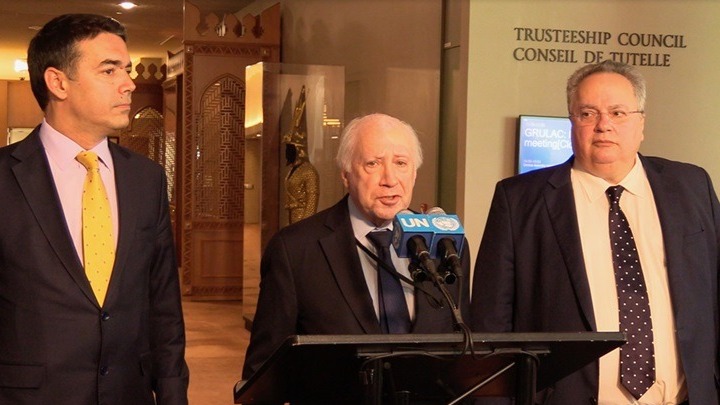
Are you planning to show your new work to the Greek audience any time soon? With which play would you like to return to the Greek stage?
The two main pillars for my work in Greek theatre – my brother Nikos Kourkoulos, actor and Artistic director of the National Theatre in Athens, and Gaga Rosic, my closest associate, dramatist, friend and translator – are sadly no longer among us. Without them, for me, Greek theatre will be different. Yet, there is still a big group of actors and other associates in Athens and Thessaloniki that I worked with intensely on three projects as well as a large group of young directors and actors that attended my workshop held on the Experimental Stage of the National Theatre of Greece over a number of weeks and it is with joy that I remember our cooperation. So when an opportunity arises, I will gladly return to them. And this time will be not as a theatre director from FYROM, but from the Republic of North Macedonia. Or, more precisely, as a man of the Theatre, which is my true fatherland.
*Interview by Lina Syriopoulou
Read more via Greek News Agenda: Miroslav Grchev: the Prespes Agreement leaves the faux-patriots without fuel; Othon Anastasakis: We must focus on the positive outcomes of the Prespes Agreement; “The name issue and the inescapable national road” by Prof. Nikos Marantzidis; Agreement on the name issue ends disputes between Greece and FYROM; Thessaloniki Mayor Yiannis Boutaris on Macedonia as a geographical region and the possible resolution of FYROM’s name issue; Think Tanks | Thanos Veremis on the FYROM name issue, European Policy for the Balkans and Greece’s future
TAGS: ARTS | FOREIGN AFFAIRS | GLOBAL GREEKS | INTERNATIONAL RELATIONS

